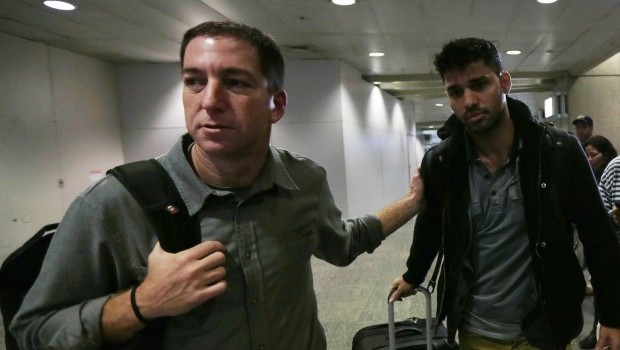
US journalist Glenn Greenwald (L) walks with his partner David Miranda in Rio de Janeiro’s International Airport in this August 19, 2013 file photo. (Reuters/Ricardo Moraes)
London, Asharq Al-Awsat—British newspaper The Guardian has responded to the detention of David Miranda, partner of the journalist who published confidential documents about the controversial National Security Agency (NSA) surveillance program, PRISM, asserting that it was forced to destroy secret files that had been used to expose the case.
An article written by Alan Rusbridger, editor of The Guardian, claimed yesterday that just over a month ago he had “received a phone call from the center of government telling me: ‘You’ve had your fun. Now we want the stuff back.’”
This was followed by “further meetings with shadowy [government] figures. The demand was the same: hand the Snowden material back or destroy it.”
This led to “one of the more bizarre moments in the Guardian’s long history,” Rusbridger told, “with two GCHQ security experts overseeing the destruction of hard drives in the Guardian’s basement.”
“Whitehall was satisfied,” the editor continued, “but it felt like a peculiarly pointless piece of symbolism that understood nothing about the digital age. We will continue to do patient, painstaking reporting on the Snowden documents, we just won’t do it in London.”
The new information about the actions of the British government came two days after the detention of Glenn Greenwald’s partner, David Miranda. The Brazilian national was stopped Sunday on arrival at Heathrow international airport, during a transit flight from Berlin to his home in Brazil.
According to The Guardian, David Miranda is not a journalist, but played an important role in covering the story of Edward Snowden’s revelations about the activities of the NSA. While in Berlin, he had been staying with Laura Poitras, and American film-maker who was involved in the Snowden story.
During the ordeal his electronic equipment—including his computer, mobile phone, hard drives, DVD’s and video games—was confiscated.
The incarceration was made possible by schedule 7 of Britain’s Terrorism Act, introduced in 2000. Miranda was interrogated for nine hours—the maximum possible under the legislation—a move which sparked widespread condemnations from human rights organizations, the Brazilian authorities, members of the opposition Labour party members, and others.
On Monday, Scotland Yard—the headquarters of the British Metropolitan Police—defended it’s course of action. A statement said that this particular case “was reviewed throughout to ensure the examination was both necessary and proportionate.”
“Our assessment is that the use of the power in this case was legally and procedurally sound,” the statement continued, although it did not specify any reasons for Miranda’s detention.
The government weighed in on the police statement, with the home secretary (interior minister), Theresa May, clarifying on Tuesday that: “The decision as to whether or not to arrest or charge somebody is entirely a matter for the police. I, as Home Secretary, don’t tell the police who to stop or who not to stop, or who to arrest and who not to arrest.”
“If it is believed that somebody has in their possession highly sensitive stolen information which could help terrorists, which could lead to a loss of lives, then it is right that the police act and that is what the law enables them to do,” she continued.
Meanwhile, the US administration—which admitted it had received a “heads up” before the detention took place—denied any role in the decision of the British government to detain Miranda, saying in a statement that it was “independent of our direction.”
There was immediate speculation that British authorities were acting on behalf of the US administration, amid rumors that US agencies were in possession of Miranda’s electronic equipment, which is yet to be returned to its owner.
Snowden is wanted in the US on charges of espionage, theft of government property, unauthorized communication of national defense information, and other criminal offenses.
Officials in Washington and London were angered by his release of the sensitive information that revealed a vast information-gathering intelligence program, known as PRISM.
The information ultimately imposed additional strains on relations between the US and Russia, where Snowden was granted temporary asylum at the beginning of August. This culminated with president Barack Obama cancelling a meeting with Russian president Vladimir Putin, which had been scheduled for early September.
Jen Psaki, spokesperson for the US state department, said Monday in a press briefing that the US does “have a close law enforcement and intelligence relationship with the UK and we were informed in advance, but we did not ask UK authorities to undertake this operation.”
